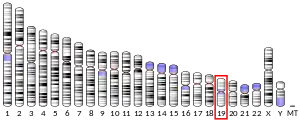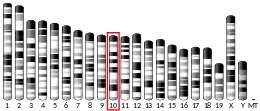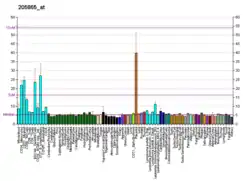ARID3A
AT-rich interactive domain-containing protein 3A is a protein that in humans is encoded by the ARID3A gene.[5][6]
Function
This gene encodes a member of the ARID (AT-rich interaction domain) family of DNA binding proteins. It was found by homology to the Drosophila dead ringer gene, which is important for normal embryogenesis. Other ARID family members have roles in embryonic patterning, cell lineage gene regulation, cell cycle control, transcriptional regulation, and possibly in chromatin structure modification.[6]
References
- GRCh38: Ensembl release 89: ENSG00000116017 - Ensembl, May 2017
- GRCm38: Ensembl release 89: ENSMUSG00000019564 - Ensembl, May 2017
- "Human PubMed Reference:". National Center for Biotechnology Information, U.S. National Library of Medicine.
- "Mouse PubMed Reference:". National Center for Biotechnology Information, U.S. National Library of Medicine.
- Kortschak RD, Reimann H, Zimmer M, Eyre HJ, Saint R, Jenne DE (Jul 1998). "The human dead ringer/bright homolog, DRIL1: cDNA cloning, gene structure, and mapping to D19S886, a marker on 19p13.3 that is strictly linked to the Peutz-Jeghers syndrome". Genomics. 51 (2): 288–92. doi:10.1006/geno.1998.5259. PMID 9722953.
- "Entrez Gene: ARID3A AT rich interactive domain 3A (BRIGHT-like)".
- Nixon JC, Rajaiya JB, Ayers N, Evetts S, Webb CF (Mar 2004). "The transcription factor, Bright, is not expressed in all human B lymphocyte subpopulations". Cellular Immunology. 228 (1): 42–53. doi:10.1016/j.cellimm.2004.03.004. PMID 15203319.
- Suzuki M, Okuyama S, Okamoto S, Shirasuna K, Nakajima T, Hachiya T, Nojima H, Sekiya S, Oda K (Aug 1998). "A novel E2F binding protein with Myc-type HLH motif stimulates E2F-dependent transcription by forming a heterodimer". Oncogene. 17 (7): 853–65. doi:10.1038/sj.onc.1202163. PMID 9780002.
Further reading
- Kortschak RD, Tucker PW, Saint R (Jun 2000). "ARID proteins come in from the desert". Trends in Biochemical Sciences. 25 (6): 294–9. doi:10.1016/S0968-0004(00)01597-8. PMID 10838570.
- Suzuki M, Okuyama S, Okamoto S, Shirasuna K, Nakajima T, Hachiya T, Nojima H, Sekiya S, Oda K (Aug 1998). "A novel E2F binding protein with Myc-type HLH motif stimulates E2F-dependent transcription by forming a heterodimer". Oncogene. 17 (7): 853–65. doi:10.1038/sj.onc.1202163. PMID 9780002.
- Peeper DS, Shvarts A, Brummelkamp T, Douma S, Koh EY, Daley GQ, Bernards R (Feb 2002). "A functional screen identifies hDRIL1 as an oncogene that rescues RAS-induced senescence". Nature Cell Biology. 4 (2): 148–53. doi:10.1038/ncb742. hdl:1874/15575. PMID 11812999. S2CID 1392204.
- Kaiwen M (Jun 2002). "[Involvement of E2FBP1, an ARID family member protein, in the p53 regulatory pathway]". Kōkūbyō Gakkai Zasshi. The Journal of the Stomatological Society, Japan. 69 (2): 152–61. doi:10.5357/koubyou.69.152. PMID 12136662.
- Goebel P, Montalbano A, Ayers N, Kompfner E, Dickinson L, Webb CF, Feeney AJ (Sep 2002). "High frequency of matrix attachment regions and cut-like protein x/CCAAT-displacement protein and B cell regulator of IgH transcription binding sites flanking Ig V region genes". Journal of Immunology. 169 (5): 2477–87. doi:10.4049/jimmunol.169.5.2477. PMID 12193717.
- Ma K, Araki K, Ichwan SJ, Suganuma T, Tamamori-Adachi M, Ikeda MA (Apr 2003). "E2FBP1/DRIL1, an AT-rich interaction domain-family transcription factor, is regulated by p53". Molecular Cancer Research. 1 (6): 438–44. PMID 12692263.
- Fukuyo Y, Mogi K, Tsunematsu Y, Nakajima T (Jul 2004). "E2FBP1/hDril1 modulates cell growth through downregulation of promyelocytic leukemia bodies". Cell Death and Differentiation. 11 (7): 747–59. doi:10.1038/sj.cdd.4401412. PMID 15017387.
- Nixon JC, Rajaiya JB, Ayers N, Evetts S, Webb CF (Mar 2004). "The transcription factor, Bright, is not expressed in all human B lymphocyte subpopulations". Cellular Immunology. 228 (1): 42–53. doi:10.1016/j.cellimm.2004.03.004. PMID 15203319.
- Rajaiya J, Nixon JC, Ayers N, Desgranges ZP, Roy AL, Webb CF (Jun 2006). "Induction of immunoglobulin heavy-chain transcription through the transcription factor Bright requires TFII-I". Molecular and Cellular Biology. 26 (12): 4758–68. doi:10.1128/MCB.02009-05. PMC 1489113. PMID 16738337.
- Olsen JV, Blagoev B, Gnad F, Macek B, Kumar C, Mortensen P, Mann M (Nov 2006). "Global, in vivo, and site-specific phosphorylation dynamics in signaling networks". Cell. 127 (3): 635–48. doi:10.1016/j.cell.2006.09.026. PMID 17081983.
- Lin D, Ippolito GC, Zong RT, Bryant J, Koslovsky J, Tucker P (2007). "Bright/ARID3A contributes to chromatin accessibility of the immunoglobulin heavy chain enhancer". Molecular Cancer. 6: 23. doi:10.1186/1476-4598-6-23. PMC 1852116. PMID 17386101.
- Liao TT, Hsu WH, Ho CH, Hwang WL, Lan HY, Lo T, Chang CC, Tai SK, Yang MH (January 2016). "let-7 Modulates Chromatin Configuration and Target Gene Repression through Regulation of the ARID3B Complex". Cell Reports. 14 (3): 520–33. doi:10.1016/j.celrep.2015.12.064. PMID 26776511.
ARID3A was identified as let-7 target. Let-7i repressed ARID3A expression by binding to the 3′ UTR of the ARID3A transcript. In the absence of let-7, importin-9 facilitates the nuclear import of ARID3A, which then forms a complex with ARID3B.
External links
- ARID3A+protein,+human at the U.S. National Library of Medicine Medical Subject Headings (MeSH)
- Human ARID3A genome location and ARID3A gene details page in the UCSC Genome Browser.
This article incorporates text from the United States National Library of Medicine, which is in the public domain.
This article is issued from Wikipedia. The text is licensed under Creative Commons - Attribution - Sharealike. Additional terms may apply for the media files.




